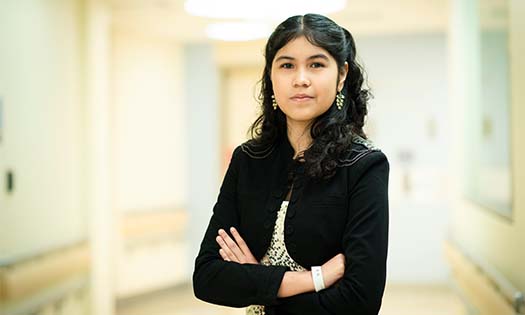When a 4-year-old patient had a resistant pilomyxoid astrocytoma on her brain and spine, her UT Southwestern physicians in the Pauline Allen Gill Center for Cancer and Blood Disorders at Children’s Health℠ were running out of treatment options. They had tried a series of chemotherapies over three years: carboplatin vincristine, vinblastine, carboplatin etoposide and cyclophosphamide, and a combination of bevacizumab and irinotecan — but her tumor progressed through all of them.
“Radiating the brain and spine of such a young child could have severe effects, but sequencing revealed another option,” says Laura Klesse, M.D., Ph.D., Pediatric Oncologist and Associate Professor at UT Southwestern. “We found a V600C mutation in the RAF gene, and we knew that a MEK inhibitor called Trametinib could potentially help.”
Thanks to the innovative drug, the tumor has remained stable for more than four years, and the child continues to do well. Now Dr. Klesse and her colleague Erin Butler, M.D., Pediatric Oncologist and Instructor at UT Southwestern, are working to bring targeted approaches to more children in what the Pediatric Hematology/Oncology Division Chief, Stephen Skapek, M.D., has branded as a multi-faceted “Precision Medicine Program”. One important facet of this is to use tumor biopsy or resection specimens to build a growing collection of patient-derived xenograft (PDX) models that could help identify targeted therapies for more types of cancer in children.
“The PDX models reflect a renewable resource that offers a more accurate representation of the cancer biology than cell lines maintained in a tissue culture dish. The hope is that the PDX models will respond to therapies in ways that more closely reflect what happens in patients.” Dr. Butler says.
A Statewide Cancer Research Collaboration
The PDX work is led by Drs. Klesse and Butler, as well as Kathleen Ludwig, M.D., Pediatric Oncologist and Assistant Professor at UT Southwestern, and is part of the UT Southwestern Pediatric Hematology-Oncology Biorepository (PHOBR) study. It is particularly important to note that the PDX work represents a collaborative research effort supported by the Cancer Prevention and Research Institute of Texas (CPRIT), and is primarily led by Peter Houghton, Ph.D. and his team at the Greehey Children’s Cancer Research Institute at UT Health San Antonio.
In this collaboration, tumor biopsy specimens are sent from our center to San Antonio, where Dr. Houghton’s team generates the PDX models. Then Drs. Butler, Klesse and other UT Southwestern researchers analyze the gene expression and gene mutation signatures in comparison with the original tumor as the PDX models are passaged in the laboratory over time.
“We try to approach the parents of every child who come to us for evaluation and treatment of a tumor or any form of cancer, including leukemia; we invite them to participate in this type of study, and we’ve enrolled over 400 patients into the Precision Medicine Program,” Dr. Butler says. “In the past several years, we’ve sent 175 tumors for PDX generation and there are over 50 unique PDX models currently growing.”
Using CRISPR to Search for Precision Cancer Therapies
As the Precision Medicine Program grows, the research team will continue using the PDX models to explore new treatments. Dr. Butler recently took a key step in her research by launching a pilot study where she and her colleagues are using Clustered Regularly Interspaced Short Palindromic Repeats (CRISPR), to try and identify novel drugs for Ewing sarcoma and rhabdomyosarcoma.
“We’re going to first treat cells using a CRISPR tool to see which genes can be targeted by FDA-approved drugs,” she says. “Then we'll further study those drugs in the laboratory and, possibly, in a future clinical trial.”
The pilot study is a step closer to expanding the library of treatments known to be effective for cancers with specific genetic profiles.
“The PDX models are one of the best tools we have for drug discovery and they’ll give us the ability to do true precision medicine, where we can test a variety of therapies against the individual tumors to see what works best,” Dr. Butler says.
Goal: Targeted Therapies for Treatment-Resistant Tumors
Dr. Butler is hopeful.
“Over time, I think our program will expand the use of the PDX models to pull out the tumors that don’t respond as well so we can do a much more in-depth analyses using next-generation DNA and RNA sequencing tools and compare that to the therapy responses,” she says.
The PDX models are just one part of the Precision Medicine Program’s larger push to bring targeted therapies to more patients. Children’s Health/UTSW was one of several centers participating in the landmark clinical trial of larotrectinib — the second drug ever approved for a specific molecular change, regardless of tumor type.
“When I started practicing 15 years ago, Gleevec for chronic myeloid leukemia (CML) with the classic translocation was really the only medicine anybody had ever heard of that could target a mutation,” Dr. Klesse says. “The field has shifted dramatically since then — we’re at the cusp of being able to target these tumors much more precisely and treat them much more effectively.”
Drs. Klesse, Ludwig, and Butler hope that the development and use of PDX models will help improve outcomes for pediatric patients with cancers that resist treatment.
“This option for patients like our 4-year-old with the resistant pilomyxoid astrocytoma will be one more tool in our arsenal of treatments,” Dr. Klesse says.
Children’s Health, Children’s Medical Center Dallas is home to the Pauline Allen Gill Center for Cancer and Blood Disorders and the clinical team invites every pediatric cancer patient to participate in the Precision Medicine Program. A majority of patients enroll, enabling the team to sequence samples from a large cohort of patients with high risk tumors, including patients with leukemia, as well as significant numbers of patients with brain tumors, and bone and soft tissue cancers.
The program’s success is a direct result of our academic affiliation with UT Southwestern and close collaboration with the Harold C. Simmons Comprehensive Cancer Center, the only NCI-designated Comprehensive Cancer Center in North Texas. This relationship with UT Southwestern affords patients access to world-renowned expertise, innovative research and the latest clinical trials not available at many other programs.


